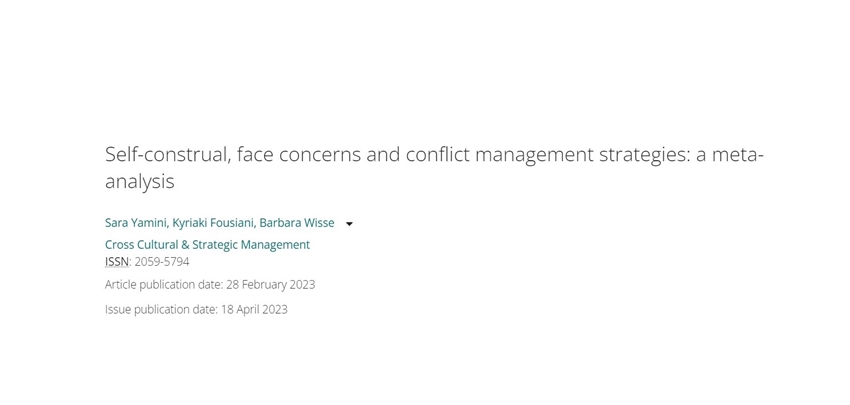Self-construal, face concerns and conflict management strategies: a meta-analysis

This meta-analysis investigates the relationship between self-construal, conflict management strategies, and face concerns. Using meta-analytic structural equation modeling (MASEM), the study analyzed data from two hundred fifty-four effect sizes based on thirty-three studies. The results showed that individuals with stronger independent self-construal and self-face concerns tend to use forcing, while those with stronger interdependent self-construal and other-face concerns are inclined towards problem-solving and yielding strategies. The study contributes to the understanding of face-negotiation theory and interpersonal conflict resolution.
Purpose
In this meta-analysis, the authors investigate the relationship between self-construal and conflict management strategies and shed light on the inconsistent findings in the literature. Moreover, they examine the mediating role of face concerns in this relationship. Importantly, the present meta-analysis is the first to test the assumptions of face-negotiation theory with the meta-analytic structural equation modeling (MASEM), which enabled the authors to test the hypothesized relationships in one single model.
Design/methodology/approach
The authors used the method of MASEM to test the relationship between self-construal and conflict management and assess the mediating role of face concerns. In this regard, the authors employed one-stage meta-analytic structural equation modeling to perform MASEM and its moderators.
Findings
Two hundred fifty-four effect sizes based on thirty-three studies were pooled in this meta-analysis. The authors found that individuals with stronger independent self-construal and stronger self-face concerns were more likely to use forcing. Moreover, the relationship between independent self-construal and forcing was mediated by self-face concerns. Individuals with a stronger interdependent self-construal and individuals with stronger other-face concerns were more likely to use problem-solving and yielding. The relationship between interdependent self-construal and problem-solving and yielding was mediated by other-face concerns. Finally, interdependent self-construal also had an indirect effect, via other-face concern, on avoiding and compromising.
Originality/value
The present meta-analysis is the first effort that the authors are aware of to test the assumptions of face-negotiation theory (FNT) using MASEM method. The authors used one-stage meta-analytic structural equation modeling viewed as the state of the methods to perform MASEM and its moderators. They employed full information meta-analytic structural equation modeling to show the generalizability and heterogeneity of structural equation modeling parameters. They applied studentized deleted residuals to assess outlier analysis and also conducted different methods to perform MASEM to check the robustness of the findings resulted. Finally, the current study adds multiple methods of assessing for publication bias.
You can read the full paper here.

